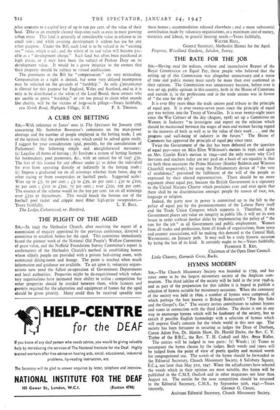THE RATE FOR THE JOB
Sut,—Having read the tedious, verbose and inconclusive Report of the Royal Commissicn on Equal Pay, those people who believed that the setting up of this Commission was altogether unnecessary and a waste of time and public money must surely be more than ever confirmed in their opinion. The Commission was unnecessary because, before ever it was set up, public opinion in this country, both in the House of Commons and outside it, in the professions and in the trade unions was in favour of " the rate for the job."
It is over fifty years 6.nce the trade unions paid tribute to the principle of equal pay. It is over twenty-seven years since the principle of equal pay was written into the Treaty of Versailles. It is over twenty-eight years since the War Cabinet-of the day (August, 1918) set up a Committee on Women in Industry " to investigate and report on the relation which should be maintained between the wages of men and women having regard to the interests of both as well as to the value of their work . . . and the progress and well-beirig of industry in the future." The House of Commons has approved the principle of equal pay since 1920.
Twice the Government of the day has been defeated on the question of equal pay—once on Miss Ellen Wilkinson's motion in 1936, and again on Mrs. Cazelet Keir's motion in 1944—and the only reason why Civil Servants and teachers today are not paid on a basis of sex equality is that on both these occasions the Prime Minister (Stanley Baldwin and Winston Churchill respectively), by using the Parliamentary device of " the vote of confidence," preverited the fulfilment of the will of the people as expressed by their elected representatives. There should be no more argument about equal pay, because the British Government is a signatory to the United Nations Charter which proclaims over and over again that there shall be no discrimination amongst people by reason of race, sex, language or religion. Indeed, the party now in power is committed up to the hilt to the policy of equal pay by the pronouncements of the Labour Party itself and the Trade Union Congress which supports it. Therefore, if the Government places any value on integrity in public life, it will set its own house in order without further delay by implementing the policy of " the rate for the job " in all Government and public employment. Women from all trades and professions, from all kinds of organisations, from town and country associations, will be making this demand at the Central Hall, Westminster, on January 30th. It may well be a truly historic occasion by being the last of its kind. It certainly ought to be.—Yours faithfully,
FLORENCE E. KEY,
Chairman of the Open Door Council. . Little Chantry, Gerrards Cross, Bucks.


































 Previous page
Previous page